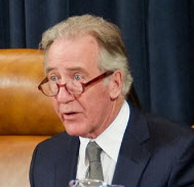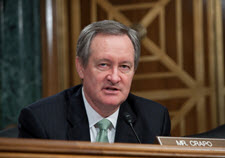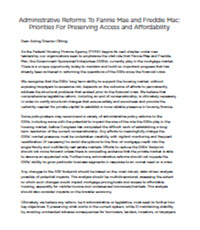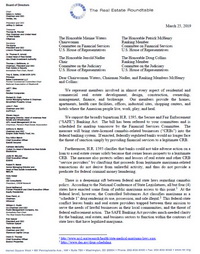The House Ways and Means Committee this week signaled its upcoming tax policy priorities after holding a hearing on the 2017 Tax Cuts and Jobs Act (“TCJA”) entitled “The 2017 Tax Law and Who It Left Behind.” The March 27th hearing was the first one focused on the TCJA since Democrats took control of the House, with policymakers examining which provisions they plan to reverse or refine.
 |
House Ways and Means Committee Chairman Richard Neal (D-MA) signaled the committee's upcoming tax policy priorities . |
The House bill (H.R. 1869) would correct a TCJA mistake that inadvertently lengthened the cost recovery period for qualified improvement property (QIP). A companion bill in the Senate (S. 803) was introduced earlier this month by Sens. Pat Toomey (R-PA) and Doug Jones (D-AL). (Roundtable Weekly, March 15). The Roundtable strongly supports the legislation.
Comment Letters – Carried Interest and FIRPTA Repeal
The Roundtable and 13 other national real estate organizations sent a letter this week to members of the House Ways and Means Committee about the adverse impact that recently introduced carried interest legislation (H.R. 1735) would have on U.S. real estate and entrepreneurial risk taking.
 |
The Roundtable and 13 other national real estate organizations submitted comments about recently introduced carried interest legislation (H.R. 1735). |
Repealing FIRPTA is a key policy action Congress could take to help spur infrastructure improvements and contribute to economic growth, according to recommendations submitted March 20 by The Real Estate Roundtable to the House Ways and Means Committee. (Roundtable Statement for the Record)
Senate Banking Committee Chairman Mike Crapo (R-ID) and President Trump this week launched separate efforts aimed at reforming the multi-trillion-dollar financial market for single-family and multifamily mortgages, including the Government-Sponsored Enterprises (GSEs) Fannie Mae and Freddie Mac.
 |
Senate Banking Committee Chairman Mike Crapo (R-ID) held hearing this week on reforming the multi-trillion-dollar housing finance markets. |
 |
The Real Estate Roundtable and 27 industry organizations on March 1 submitted principles for reforming the (GSEs). |
The Real Estate Roundtable and 27 industry organizations on March 1 submitted principles for reforming the (GSEs). The coalition’s letter was sent to Acting Federal Housing Finance Agency (FHFA) Director Joseph Otting and Washington policymakers days after the Senate Banking Committee advanced the nomination of Mark Calabria as FHFA Director. (Roundtable Weekly, March 1)
Calabria is awaiting full Senate confirmation, which is expected soon.
The House Financial Services Committee on March 27 approved the Secure and Fair Enforcement (SAFE) Banking Act of 20119 (H.R. 1595), which would allow financial institutions to legally work with state-authorized cannabis-related businesses.
 |
The Roundtable earlier in the week sent a letter urging swift enactment of the legislation to the leadership of the House Financial Services and Judiciary Committees. |
Rep. Perlmutter noted the broad support for the legislation from the business community, including The Roundtable, in a March 28 news release. Perlmutter added, “With 152 cosponsors at the time of the committee vote – over a third of the entire House – the bill will next move to the floor of the House. A Senate companion bill is also expected to be introduced in the coming weeks.”